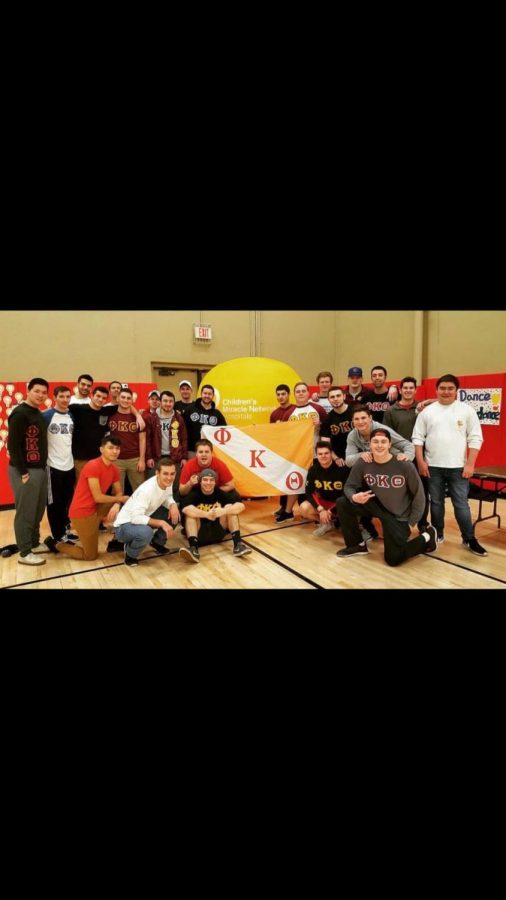Greek life concerns heard
Members of Phi Kappa Theta pose during a fundraising event for Ann & Robert H. Lurie’s Children Hospital.
March 26, 2018
The NIU administration is currently developing a plan to address concerns Greek organizations have regarding the university’s lack of transparency and social sanction policies.
Phi Kappa Theta has been working with administrative officials to reshape student conduct policies. NIU Spokesperson Joe King said the administration has begun to develop a plan to address some of the organization’s concerns in a group consisting of Chris McCord, executive vice president and provost, as well as students, faculty, staff and alumni.
Phi Kappa Theta members attended the Feb. 15 and March 10 Board of Trustees meetings to address concerns about the university’s lack of transparency with a student watchlist and student conduct policies they consider unfair.
Evan Johnson, Phi Kappa Theta president, said there has been a great deal of strides made within in the Greek community to address their grievances with student conduct, including the opportunity to allow Greek organizations to work with their national chapters to provide an educational experience when violations occur.
“This initiative will be guided by a working group convened by Dr. Chris McCord, executive vice president and provost,” King said. “To reflect a variety of relevant perspectives, the group will be comprised of students, faculty, staff and alumni and will have access to the expertise of a neutral, outside expert.”
The administration was informed in October that members of Alpha Sigma Alpha and Phi Kappa Theta had violated the Off-Campus Social Events Policy, an agreement between the administration and each Greek organization, NIU Spokesperson Joe King said in a March 23 email.
All Greek organizations must attend a mandatory meeting detailing event policies concerning off-campus occurrences, student conduct expectations and a discussion about substance abuse held at the beginning of each academic year where each group’s president is obligated to read and sign an agreement with the university regarding off-campus event policies, King said. He said if an organization violates the off-campus event policies or relationship agreement, the administration has to take corrective measures.
Alpha Sigma Alpha and Phi Kappa Theta were separately sanctioned and ultimately lost their active student organization status, King said.
After the incident was reported, the organizations were found responsible and the hearings were held, which is how the sanction process occurs, according to the Student Code of Conduct. The sorority and fraternity were both given appropriate penalties.
“They were saying it was an unrecognized party,” said Evan Johnson, Phi Kappa Theta president. “What the school was saying was that there was an unregistered event and because of that you guys have all of these sanctions.”
King said during an administrative hearing the organizations were interviewed, and university officials developed a better understanding about the events and violations that were under investigation and established that both organizations hosted five different events that violated social event policies throughout a week in October.
Four of the five sanctions levied against Phi Kappa Theta are level three violations, according to the Office of Student Conduct webpage. The level of the violations represents the number of times the student organization committed that specific misconduct.“Due to the number of incidents and violations, all three members of the Student Conduct team were involved, as well as a hearing officer, appeal agent and a member of the General Counsel’s staff at various points in the process,” King said.
Similar incidents surfaced involving other Greek organizations while dealing with the two organization’s hearings that required adjustment to the administration’s staple approach, King said.
“As with any community, the actions of some should not be taken to represent the entire group,” King said. “However, the number and scope of the issues encountered this academic year signal to NIU leadership that there is a larger cultural problem.”
Accountability needs to be present on both the administration and student organizations. If students are required to follow a set of rules, the university should have their own set of rules as well said Kristen Foley, parent of a Phi Kappa Theta member.
Foley said sanctions placed on organizations should allow students to learn from their experiences and correct their actions. She said if students chose not to correct their faults, the administration should continue with a more aggressive evaluation.
“[NIU] needs to have an understanding of why the violation happened in the first place and was it a misunderstanding about what the rules were,” Foley said. “Were the rules not communicated to the right people in the house, why the violation existed in the first place, and then the sanction should be crafted to allow the students to address the area where there was failure in.”
Foley said Phi Kappa Theta was willing to accept responsibility immediately but contested inaccurate statements the university filed.
Johnson declined to say which statements were inaccurate and said it was more important to focus on the strides being made to correct the current process.
Despite the initial differences and misunderstanding, Foley said she is “hopeful that the school and the Greek organizations can come together and work through any differences and strengthen the Greek community.”
Johnson said he’s interested to see how the university intends to restore trust with members of the Greek community but is hopeful about the future and is thankful for all of the parents, faculty, other Greek organizations and alumni who’ve supported his organization through the process.
“There’s going to be a lot of work in that, but those who realize it’s going to be a lot of work, I’m thankful for being able to partner with them,” Johnson said.







